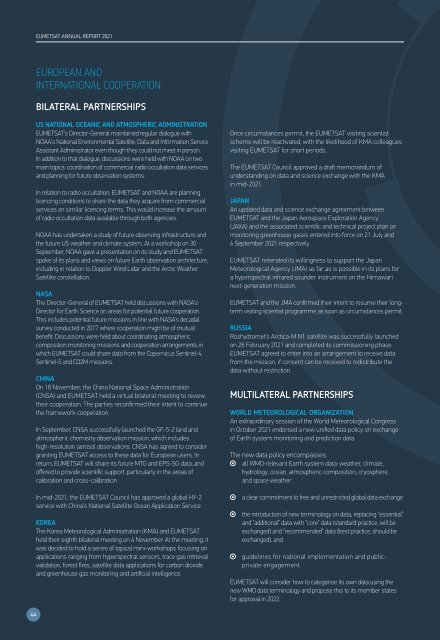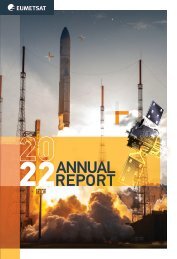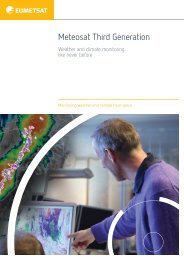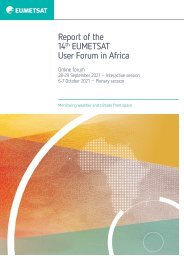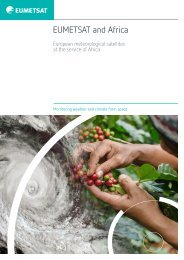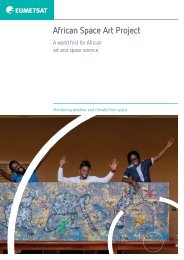EUMETSAT Annual Report 2021
Create successful ePaper yourself
Turn your PDF publications into a flip-book with our unique Google optimized e-Paper software.
<strong>EUMETSAT</strong> ANNUAL REPORT <strong>2021</strong><br />
EUROPEAN AND<br />
INTERNATIONAL COOPERATION<br />
BILATERAL PARTNERSHIPS<br />
US NATIONAL OCEANIC AND ATMOSPHERIC ADMINISTRATION<br />
<strong>EUMETSAT</strong>’s Director-General maintained regular dialogue with<br />
NOAA's National Environmental Satellite, Data and Information Service<br />
Assistant Administrator even though they could not meet in person.<br />
In addition to that dialogue, discussions were held with NOAA on two<br />
main topics: coordination of commercial radio occultation data services<br />
and planning for future observation systems.<br />
In relation to radio occultation, <strong>EUMETSAT</strong> and NOAA are planning<br />
licencing conditions to share the data they acquire from commercial<br />
services on similar licencing terms. This would increase the amount<br />
of radio occultation data available through both agencies.<br />
NOAA has undertaken a study of future observing infrastructure and<br />
the future US weather and climate system. At a workshop on 30<br />
September, NOAA gave a presentation on its study and <strong>EUMETSAT</strong><br />
spoke of its plans and views on future Earth observation architecture,<br />
including in relation to Doppler Wind Lidar and the Arctic Weather<br />
Satellite constellation.<br />
NASA<br />
The Director-General of <strong>EUMETSAT</strong> held discussions with NASA’s<br />
Director for Earth Science on areas for potential future cooperation.<br />
This includes potential future missions in line with NASA’s decadal<br />
survey conducted in 2017 where cooperation might be of mutual<br />
benefit. Discussions were held about coordinating atmospheric<br />
composition monitoring missions and cooperation arrangements in<br />
which <strong>EUMETSAT</strong> could share data from the Copernicus Sentinel-4,<br />
Sentinel-5 and CO2M missions.<br />
CHINA<br />
On 18 November, the China National Space Administration<br />
(CNSA) and <strong>EUMETSAT</strong> held a virtual bilateral meeting to review<br />
their cooperation. The parties reconfirmed their intent to continue<br />
the framework cooperation.<br />
In September, CNSA successfully launched the GF-5-2 land and<br />
atmospheric chemistry observation mission, which includes<br />
high-resolution aerosol observations. CNSA has agreed to consider<br />
granting <strong>EUMETSAT</strong> access to these data for European users. In<br />
return, <strong>EUMETSAT</strong> will share its future MTG and EPS-SG data, and<br />
offered to provide scientific support, particularly in the areas of<br />
calibration and cross-calibration<br />
In mid-<strong>2021</strong>, the <strong>EUMETSAT</strong> Council has approved a global HY-2<br />
service with China’s National Satellite Ocean Application Service.<br />
KOREA<br />
The Korea Meteorological Administration (KMA) and <strong>EUMETSAT</strong><br />
held their eighth bilateral meeting on 4 November. At the meeting, it<br />
was decided to hold a series of topical mini-workshops focusing on<br />
applications ranging from hyperspectral sensors, trace gas retrieval<br />
validation, forest fires, satellite data applications for carbon dioxide<br />
and greenhouse gas monitoring and artificial intelligence.<br />
Once circumstances permit, the <strong>EUMETSAT</strong> visiting scientist<br />
scheme will be reactivated, with the likelihood of KMA colleagues<br />
visiting <strong>EUMETSAT</strong> for short periods.<br />
The <strong>EUMETSAT</strong> Council approved a draft memorandum of<br />
understanding on data and science exchange with the KMA<br />
in mid-<strong>2021</strong>.<br />
JAPAN<br />
An updated data and science exchange agreement between<br />
<strong>EUMETSAT</strong> and the Japan Aerospace Exploration Agency<br />
(JAXA) and the associated scientific and technical project plan on<br />
monitoring greenhouse gases entered into force on 21 July and<br />
6 September <strong>2021</strong> respectively.<br />
<strong>EUMETSAT</strong> reiterated its willingness to support the Japan<br />
Meteorological Agency (JMA) as far as is possible in its plans for<br />
a hyperspectral infrared sounder instrument on the Himawari<br />
next-generation mission.<br />
<strong>EUMETSAT</strong> and the JMA confirmed their intent to resume their longterm<br />
visiting scientist programme as soon as circumstances permit.<br />
RUSSIA<br />
Roshydromet’s Arctica-M N1 satellite was successfully launched<br />
on 28 February <strong>2021</strong> and completed its commissioning phase.<br />
<strong>EUMETSAT</strong> agreed to enter into an arrangement to receive data<br />
from the mission, if consent can be received to redistribute the<br />
data without restriction.<br />
MULTILATERAL PARTNERSHIPS<br />
WORLD METEOROLOGICAL ORGANIZATION<br />
An extraordinary session of the World Meteorological Congress<br />
in October <strong>2021</strong> endorsed a new unified data policy on exchange<br />
of Earth system monitoring and prediction data.<br />
The new data policy encompasses:<br />
all WMO-relevant Earth system data: weather, climate,<br />
hydrology, ocean, atmospheric composition, cryosphere,<br />
and space weather<br />
<br />
<br />
<br />
a clear commitment to free and unrestricted global data exchange<br />
the introduction of new terminology on data, replacing “essential”<br />
and “additional” data with “core” data (standard practice, will be<br />
exchanged) and “recommended” data (best practice, should be<br />
exchanged), and<br />
guidelines for national implementation and publicprivate<br />
engagement.<br />
<strong>EUMETSAT</strong> will consider how to categorise its own data using the<br />
new WMO data terminology and propose this to its member states<br />
for approval in 2022.<br />
44


